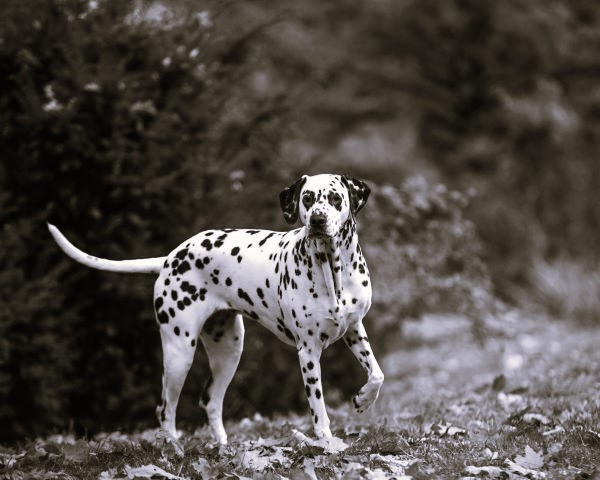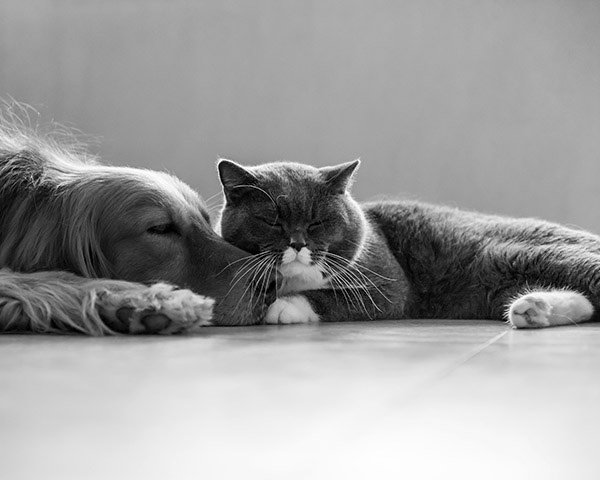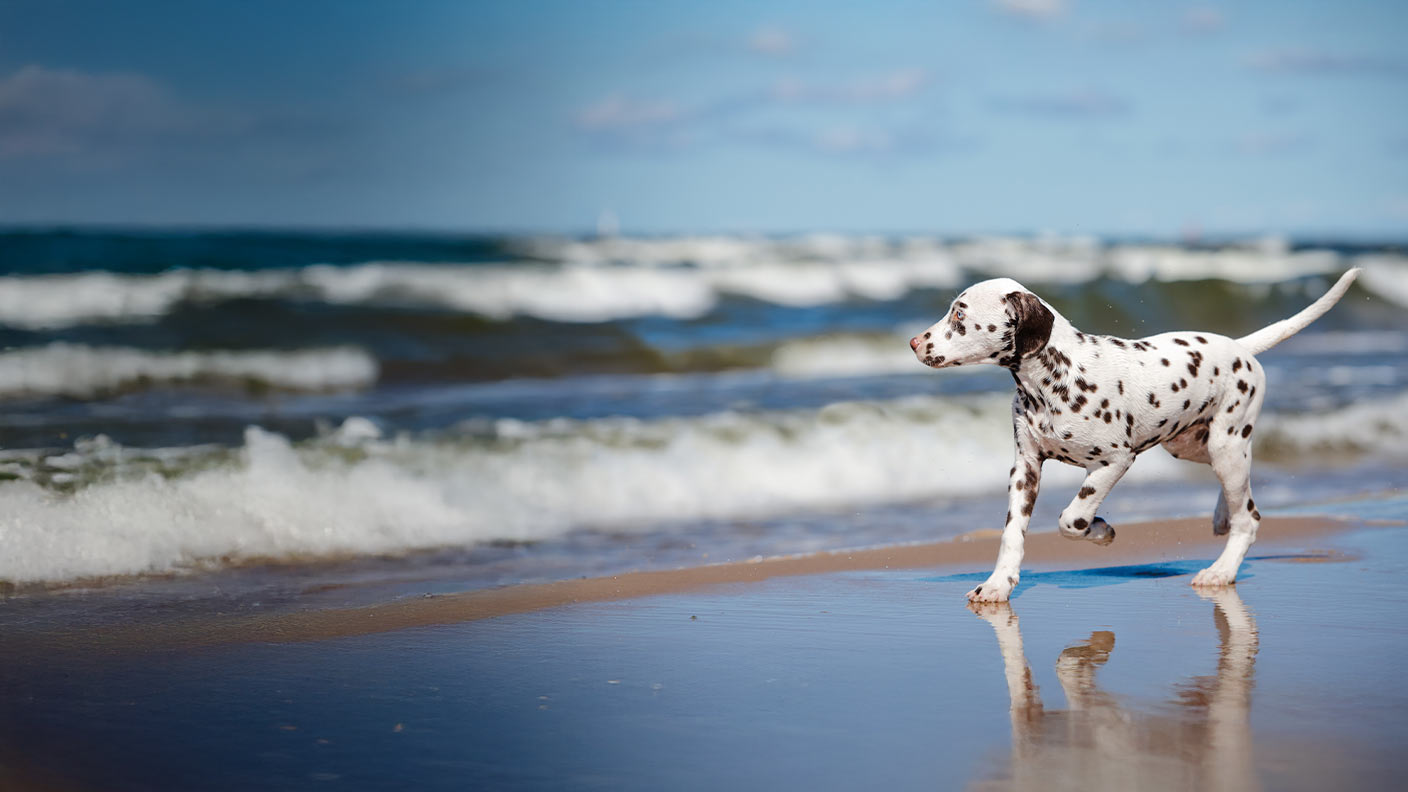Dalmatian dog breed information and advice
There’s no mistaking a Dalmatian. With an athletic stature, striking speckled coat and lively personality, this breed captures the hearts of animal lovers worldwide. The Dalmatian breed historically served as carriage dogs and guard dogs, but today they’re a playful, energetic breed that thrive on human companionship.
If you’re considering welcoming a Dalmatian dog to your home, it’s worth getting up to speed with this majestic breed. Read on for more information about Dalmatian characteristics, price, care advice and more.
Dalmatian facts

| Lifespan | 11 to 15 years |
| How much | £300 - £1,800 |
| Size | 70 - 76 cm |
| Weight | 20 - 35 kg |
| Colours | White with black or liver-coloured spots |
| Grooming | Weekly brushing required |
| Temperament | Playful, sensitive, lively |
| Exercise | Two hours per day |
Pet insurance for your Dalmatian
Dalmatians are generally a healthy breed, but accidents and illnesses can occur at any time, so it’s wise to take out dog insurance as soon as possible. Dog insurance can help to cover the costs of treatments, medication and vet bills, giving you one less thing to think about.
Common Dalmatian health issues include:
Sainsbury’s Bank Pet Insurance
With Sainsbury’s Bank Pet Insurance, you can insure your Dalmatian when they’re eight weeks old.
We have three types of pet insurance policies, each with different levels of cover – so you can choose one that suits your Dalmatian best.
- Lifetime – our most comprehensive policy which covers your Dalmatian dog with access to up to £10,000 towards vet fees each year.
- Maximum benefit – claim for the same condition multiple times during the policy’s lifetime and get cover for vet costs of up to £6,000.
- Time limited – covers your dog with vet costs for short-term health conditions of up to £3,000, or for 12 months.
If you have more than one furry friend, we also offer multi-pet insurance.
Please note that we won't cover any pre-existing conditions and that terms, conditions, excesses, exclusions and limitations apply.
How to care for a Dalmatian
Dalmatians are large dogs with high energy levels to match – so zoomies are commonplace. Their feeding, grooming and exercise needs may be more suitable for experienced pet parents. But like other breeds, your pooch will thrive with the right level of love, care and attention.
Feeding and nutrition
Your Dalmatian’s diet will vary depending on their lifestyle and age. Feeding them well-balanced, high-quality dog food can keep them in ideal shape. Always check the food packaging for instructions on how much food to give them.
Dalmatians can be prone to bladder stones, so consider a low-purine diet with limited beef, liver and kidney. It’s also worth holding back on table scraps, as Dalmatians can have a high level of uric acid.
When bringing your dog home for the first time, try to feed them at the same time every day to build a routine. Make sure to leave a gap after eating before taking your furry friend out for some exercise.
Grooming
Dalmatians are one of the most recognisable breeds in the world, and it’s all thanks to their coat. Short, dense and dotted with spots, a Dalmatian’s coat is fairly low maintenance.
You can get away with occasional baths and a weekly brush with a horsehair mitt or rubber comb. But Dalmatians do shed a lot – especially during spring and autumn – which can tickle the noses of people with fur allergies.
The breed are also prone to skin allergies, so consider shampoos and products that are designed for sensitive skin. Always trim their nails once a month, brush their teeth weekly and check their ears for any signs of infection.
Exercise
Dalmatians are energetic dogs that need regular exercise to stay fit and healthy. They’re well known for their endurance and speed you’ll need to take them on lots of walks to use up their energy.
Your Dalmatian will need at least two hours of exercise a day – whether that’s through free running or a brisk walk on a lead. They can easily get into mischief without enough physical and mental exercise, so don’t forget to introduce fun puzzle games too.
Training
Dalmatian dogs are as intelligent as they are active, so they are easily trained. Thanks to their history as carriage dogs and firedogs – Dalmatians are at their best when they have a job to do.
Structured training sessions that cater to their high energy levels and bright nature works well for them. This can include fetch, agility training, puzzle toys and interactive games.
This breed can be very sensitive, so positive reinforcement such as treats, praise and head pats are a must. It’s important to train and socialise your Dalmatian early to ensure they grow into a confident, well-mannered companion.
Temperament and behaviour
Dalmatians make great companions thanks to their energetic and playful personalities. They’re friendly, outgoing pups that enjoy being part of the family. They’re also people-orientated and are great with kids when properly socialised and supervised.
While they’re generally well-mannered, Dalmatian dogs can be reserved when meeting new people. Early socialisation and training are essential.
Common health problems
Dalmatians are robust, agile dogs, but they aren’t without their health issues. Keeping up with regular vet appointments is crucial to being a pet parent. It’s important to cover for conditions before they appear, since pre-existing conditions won’t be included in a new dog insurance policy.
Dalmatian bronzing syndrome
Dalmatian bronzing syndrome, also called “Dal crud”, is a form of bacterial folliculitis seen exclusively in Dalmatian dogs. This condition causes bronze or pink colouration in the coat, which can lead to crusty skin patches, hair loss and inflamed hair follicles.
Causes of Dal crud can include stress, genetics, allergies, environmental changes or diet. Your Dalmatian may need special shampoo, antibiotics, medication or dietary changes to manage this condition.
Hip dysplasia
Hip dysplasia is a malformation in the dog’s hip joints during growth, affecting Dalmatians and other large breeds. This occurs when the ball and socket joints in the pelvis grow at different rates, leading to arthritis and immobility.
Treatment can range from non-steroidal anti-inflammatory drugs (NSAIDS), joint supplements, injections and physical therapy.
Hereditary deafness
Deafness is inherited in the Dalmatian breed, with 5% of Dalmatians born totally deaf, and another 15-30% reportedly deaf in one ear. An otherwise healthy pooch that fails to respond to verbal cues, barks excessively and is easily startled may have deafness in one of both ears.
It’s important to test your Dalmatian’s hearing through the BAER testing programme as early as possible. Deaf dogs will require special training, such as using hand signals instead of voice commands.
Bladder stones
Bladder stones (or uroliths) are more likely to develop in Dalmatians than other breeds. When rock-like mineral formations develop in the urinary bladder, bladder stones are formed. Common signs include blood in the urine and straining to urinate.
Dogs with bladder stones can be treated with surgical removal, non-surgical removal through urohydropropulsion and dietary dissolution.
So, is a Dalmatian right for you?
Dalmatians are delightful dogs with a friendly, outgoing nature. They’re great with humans young and old, and can easily fit in with full, active households.
With such low maintenance fur, grooming your Dalmatian is easier than other breeds. They’re also well-trained, as long as you take the proper time to socialise and train them.
So, whether you want one or 101 Dalmatians, make sure you have enough of love and attention to spare. And plenty of space too.
Frequently asked questions
Do Dalmatians have a lot of health issues?
Dalmatians are susceptible to a few health issues but they are generally healthy dogs. Keeping up with vet appointments and vaccinations can help to keep your dog happy and healthy.
Are Dalmatians good family pets?
Dalmatians are great with older kids and adults, making them good family pets. They can be energetic, but their stamina and muscular build may not suit every everyone, so consider your household before bringing one home. As with other dogs, never leave your Dalmatian unsupervised with children, vulnerable adults or older people.
How long does a Dalmatian live?
The average Dalmatian lifespan is 11-15 years.
How big are Dalmatians?
Dalmatians are medium-to-large dogs that can reach up to 76 cm tall and weigh up to 35 kg. Their height and distinctive spotty coat make them one of the most recognisable breeds in the world.

Browse our guides
Choose from our list of helpful guides and information

Explore dog breeds
Find out how to keep your dog healthy and happy

Cat breed guides
How to care for your cat, common health problems and more
Terms and conditions
Important information
* Guaranteed discount for Nectar members: The discount is based on information related to you and the transactions you've made with Sainsbury's supermarkets and Sainsbury's Bank using your Nectar card. For more information go to sainsburysbank.co.uk/nectar.
Sainsbury's Bank plc, Registered Office, 33 Charterhouse Street, London, EC1M 6HA (registered in England and Wales, no 3279730) is authorised by the Prudential Regulation Authority and regulated by the Financial Conduct Authority and the Prudential Regulation Authority (register no. 184514).
Sainsbury's Supermarkets Ltd is an appointed representative of Sainsbury's Bank plc. Sainsbury's Bank plc acts as an introducer to Pinnacle Insurance Ltd who is authorised by the Prudential Regulation Authority and regulated by the Financial Conduct Authority and the Prudential Regulation Authority (register number 110866). Registered office: 4th Floor, Limelight, Elstree Way, Borehamwood, Hertfordshire, WD6 1JH. Sainsbury’s Bank Pet Insurance is arranged, administered and underwritten by Pinnacle Insurance Ltd. Sainsbury's Bank plc and Pinnacle Insurance Ltd are not part of the same corporate group.
We do not provide personal recommendations to customers.
